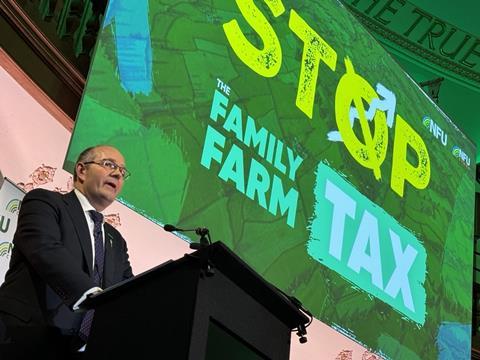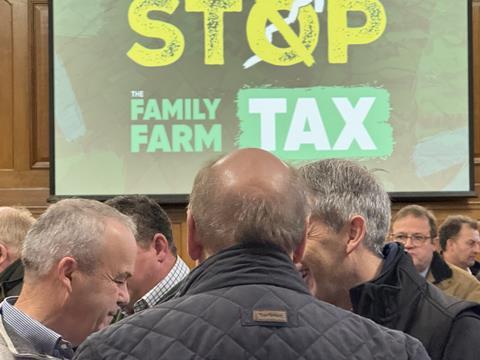Government’s APR and BPR changes have been described as a betrayal of the nation’s primary food producers

Farmers have marched to London in protest against the government’s proposed changes to Agricultural Property Relief (APR) and Business Property Relief (BPR).
Some 1,800 NFU members met at Church House in London ahead of meeting with MPs as part of a mass lobby event to highlight what the union called “the injustices and failings of the government’s proposed changes to APR and BPR”.
A larger, farmer-organised event in Whitehall was expected to attract 10,000 people and be addressed by speakers including Jeremy Clarkson.
‘Extraordinary betrayal’
Addressing members on behalf of the UK’s farming union presidents, NFU president Tom Bradshaw outlined the “extraordinary betrayal” felt by the farming community across the country. “I don’t think I’ve ever seen the industry this angry, this disillusioned and this upset,” he said. “And given what we’ve had to be angry about in recent years that’s saying something.”
Bradshaw said the government’s Budget calculations were based on “bad data”, adding that they were launched by the Treasury without consultation with either industry or even Defra.
“To launch a policy this destructive without speaking to anyone involved in farming beggars belief,” he continued. ”And let us remember that they promised not to do this when they were wooing the rural vote. It’s not only been bungled in delivery, it’s also nothing short of a stab in the back.”
Bradshaw described APR and BPR as “the straw that broke the camel’s back for farming”, coming after years of changing policy and 18 months of some of the worst weather on record. He said the Budget was “full of let-downs for our vital sector”, including accelerated BPS reductions, double-cab pick-up taxes, and new taxes on fertilisers.
“There has never been a budget this bad for farming in my lifetime,” he added. “Far from catching wealthy homeowners with a bit of land, the Treasury’s mangling of the data means those people will generally not be affected. It’s the farms producing this country’s food, which are more valuable assets, that are caught in the eye of the storm.
“The irony that this asset wealth will never become actual wealth unless farms are broken up or sold – kicking the legs out from under Britain’s food security - is a bitter one. And they will need to be broken up or sold, because farmers simply won’t have the money to pay this tax any other way.”

Bradshaw thanked the public for their support of farmers’ plight, and urged farmers to tell people how much that support means to them. Overall he encouraged them to address their local MPs directly and warn them there is a political price to be paid across Britain for supporting this “rotten” policy.
He ended his speech by warning ministers that the London rally was just the start of the NFU’s efforts, and that they will not get tired or give up. “Today isn’t the culmination of our efforts. It’s the start,” he stressed.
‘A blunt instrument’
Meanwhile, the Landworkers’ Alliance has put forward its perspective, insisting that while it believes inheritance tax is needed in principle “to create a fairer food and land-use system”, the changes put forward by the government are “a blunt instrument that could put many family farms at risk”.
The organisation argued that the changes as they currently stand won’t distinguish between large estates turning huge profits, and smaller farms striving to use more nature-friendly farming practices.
Further measures are needed to ensure that any land sold off by farmers in order to cover their tax bill must not end up in the hands of even larger estates, the alliance argued, or in the hands of investors looking to buy land for carbon and nature credit schemes or luxury developments that take land out of agricultural production.
“Farmers have been undervalued for years, and have been forced into precarious livelihoods by supply chains, supermarkets and trade rules that squeeze their margins,” the group said. ”Government must consider alternative policies like supermarket regulation, fair pricing, and trade rules to ensure farmers can earn a decent and secure living.”



